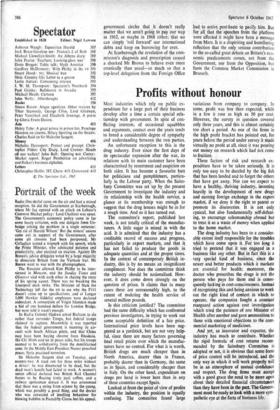Portrait of the week
Radio One-derful came on the air and had a mixed reception. So did the Government at Scarborough, where Mr Jay opened with an attack on Labour's Common Market policy : Lord Chalfont was upset. The Government's economic policy came in for some heavy criticism, with one delegate from Ux- bridge solving the problem in a single sentence: 'Get rid of Harold Wilson.' But the miners' unions carne out in support of the Government, after some pit closures had been postponed; Mr Callaghan scored .a triqmph with his speech, while the Prime Minister, who advocated patience and pioductivity, also received an ovation. Against Mr Brown's advice delegates voted bY,a large majority to dissociate Britain from the Vietnam war. Mr. Brown went to war with the photographers.
The Russians allowed Kim Philby to be inter- viewed in Moscow, and the Sunday Times and Observer vied with each other in chasing the story of his spying career. There was no breaking the Liverpool dock strike. The Minister of State for Technology left for the us to see why the F111 doesn't come up to specifications, and at Langar 1,000 Hawker Siddeley employees were declared redundant. A consortium of Virgin Islanders made a bid of one hundred dollars for London Bridge, but were told it wasn't enough.
In Biafra Colonel Ojukwu asked Biafrans to die rather than surrender Enugu, but federal troops claimed its capture. Meanwhile it was reported that the federal government is manning its air- craft with South AfriCan pilots, and that China may have been buying chrome from Rhodesia. Ho Chi Minh said no to peace talks, but his troops seemed to be withdrawing from the demilitarised zone. In the Middle East President Nasser preached peace; Syria practised terrorism.
Sir Malcolm Sargent died on Tuesday, aged seventy-two. A train ran for three miles without a driver: he was discovered to be dead, but the dead man's handle had failed to work. A seamen's union official declared two British Rail Channel ferries to be floating (only just) coffins, and a railway spokesman denied it. It was announced that there was a swing from science by the young, which was possibly a good thing, and the doctor who was convicted of insulting behaviour for blowing bubbles in Piccadilly Circus lost his appeal.


































 Previous page
Previous page